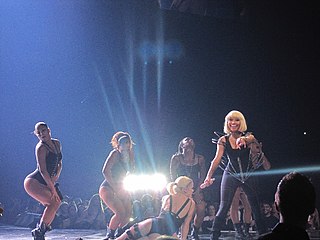
Dana Elaine Owens, better known by the stage name Queen Latifah, is an American actress, rapper and singer. She has received various accolades, including a Grammy Award, a Primetime Emmy Award, a Golden Globe Award, three Screen Actors Guild Awards, and two NAACP Image Awards, in addition to a nomination for an Academy Award. In 2006, she became the first hip hop artist to receive a star on the Hollywood Walk of Fame.
Hazel Vivian Carby is Professor Emerita of African American Studies and of American Studies. She served as Charles C. and Dorathea S. Dilley Professor of African American Studies and American Studies at Yale University.
Black feminism, also known as Afro-feminism chiefly outside the United States, is a branch of feminism that focuses on the African-American woman's experiences and recognizes the intersectionality of racism and sexism. Black feminism also acknowledges the additional marginalization faced by black women due to their social identity.

A video vixen is a female model who appears in hip hop-oriented music videos. From the 1990s to the early 2010s, the video vixen image was a staple in popular music, particularly within the genre of hip hop. The video vixen first came around in the late 1980s when the hip-hop culture began to emerge into its own lifestyle, although was most popular in American popular culture during the 1990s and 2000s. Many video vixens are aspiring actors, singers, dancers, or professional models. Artists and vixens have been criticized for allegedly contributing to the social degradation of black women. Latinas are also degraded and hyper-sexualized in hip hop music videos because they are seen as objects of sexual desire in rap music videos.

"Keep Ya Head Up" is a song by American rapper Tupac Shakur from his second studio album, Strictly 4 My N.I.G.G.A.Z...(1993). It was released on October 28, 1993 as the album's third single.

African feminism includes theories and movements which specifically address the experiences and needs of continental African women. From a western perspective, these theories and movements fall under the umbrella label of Feminism, but it is important to note that many branches of African "feminism" actually resist this categorization. African women have been engaged in gender struggle since long before the existence of the western-inspired label "African feminism," and this history is often neglected. Despite this caveat, this page will use the term feminism with regard to African theories and movements in order to fit into a relevant network of existing Wikipedia pages on global feminism. Because Africa is not a monolith, no single feminist theory or movement reflects the entire range of experiences African women have. African feminist theories are sometimes aligned, in dialogue, or in conflict with Black Feminism or African womanism. This page covers general principles of African feminism, several distinct theories, and a few examples of feminist movements and theories in various African countries.
From Black Power to Hip-Hop: Racism, Nationalism, and Feminism is a 2006 book by Patricia Hill Collins. Published by Temple University Press, the book is centered around Patricia Hill and her experiences with racism in America. The book also includes experiences from other Black men and women and their responses to it. In the end she offers her take on Black youth and how its changing along with how Black nationalism works today.
Feminist theory in composition studies examines how gender, language, and cultural studies affect the teaching and practice of writing. It challenges the traditional assumptions and methods of composition studies and proposes alternative approaches that are informed by feminist perspectives. Feminist theory in composition studies covers a range of topics, such as the history and development of women’s writing, the role of gender in rhetorical situations, the representation and identity of writers, and the pedagogical implications of feminist theory for writing instruction. Feminist theory in composition studies also explores how writing can be used as a tool for empowerment, resistance, and social change. Feminist theory in composition studies emerged in the late 1960s and early 1970s as a response to the male-dominated field of composition and rhetoric. It has been influenced by various feminist movements and disciplines, such as second-wave feminism, poststructuralism, psychoanalysis, critical race theory, and queer theory. Feminist theory in composition studies has contributed to the revision of traditional rhetorical concepts, the recognition of diverse voices and genres, the promotion of collaborative and ethical communication, and the integration of personal and political issues in writing.
Clenora F. Hudson-Weems is an African-American author and academic who is currently a professor of English at the University of Missouri. She coined the term "Africana womanism" in the late 1980s, contending that women of African descent have always been Africana womanists by their very nature, dating back to Africana women in antiquity, even before the coinage of the word itself. Africana Womanism, a family-centered paradigm, observed this phenomenon, then proceeded in naming and defining a paradigm relative to who Africana women are and how they go about their daily lives in both the home place and the workplace.
Stephanie Leigh Batiste is an American academic, author, and performance artist. She is currently associate professor in the Departments of English and Black Studies at the University of California, Santa Barbara (UCSB).
Hip hop feminism is a sub-set of black feminism that centers on intersectional subject positions involving race and gender in a way that acknowledges the contradictions in being a black feminist, such as black women's enjoyment in hip hop music and culture, rather than simply focusing on the victimization of black women in hip hop culture due to interlocking systems of oppressions involving race, class, and gender.
Misogynoir is a term referring to misogyny directed towards black women where race and gender both play a role. The term was coined by black feminist writer Moya Bailey in 2008 to address misogyny directed toward black transgender and cisgender women in American visual and popular culture. The concept of misogynoir is grounded in the theory of intersectionality, which analyzes how various social identities such as race, gender, class, age, ability, and sexual orientation interrelate in systems of oppression.
Joan Morgan is a Jamaican-American author and journalist. She was born in Jamaica and raised in the South Bronx. Morgan coined the term "hip hop feminist".
A "ride-or-die chick" is a neologism of biker culture origin referring to a "woman willing to support her partner and his risky lifestyle despite how this might endanger or harm her." The woman may even take an active role as an accomplice and manifests a "willingness to help men in dangerous situations" and "a sense of shared risk."
Feminist activism in hip hop is a feminist movement based by hip hop artists. The activism movement involves doing work in graffiti, break dancing, and hip hop music. Hip hop has a history of being a genre that sexually objectifies and disrespects women ranging from the usage of video vixens to explicit rap lyrics. Within the subcultures of graffiti and breakdancing, sexism is more evident through the lack of representation of women participants. In a genre notorious for its sexualization of women, feminist groups and individual artists who identify as feminists have sought to change the perception and commodification of women in hip hop. This is also rooted in cultural implications of misogyny in rap music.

Technofeminism explores the role gender plays in technology. It is often examined in conjunction with intersectionality, a term coined by Kimberlé Crenshaw which analyzes the relationships among various identities, such as race, socioeconomic status, sexuality, gender, and more. However, many scholars, such as Lori Beth De Hertogh, Liz Lane, and Jessica Oulette, as well as Angela Haas, have spoken out about the lack of technofeminist scholarship, especially in the context of overarching technological research.
In the United States, the introduction of new styles of music came during the Transatlantic Slave Trade era. The genres of music include, but are not limited to, blues, rock, gospel music, jazz, bluegrass, and Hip-hop. Black American women in the music industry have made significant contributions over the years.

Feminist rhetoric emphasizes the narratives of all demographics, including women and other marginalized groups, into the consideration or practice of rhetoric. Feminist rhetoric does not focus exclusively on the rhetoric of women or feminists, but instead prioritizes the feminist principles of inclusivity, community, and equality over the classic, patriarchal model of persuasion that ultimately separates people from their own experience. Seen as the act of producing or the study of feminist discourses, feminist rhetoric emphasizes and supports the lived experiences and histories of all human beings in all manner of experiences. It also redefines traditional delivery sites to include non-traditional locations such as demonstrations, letter writing, and digital processes, and alternative practices such as rhetorical listening and productive silence. According to author and rhetorical feminist Cheryl Glenn in her book Rhetorical Feminism and This Thing Called Hope (2018), "rhetorical feminism is a set of tactics that multiplies rhetorical opportunities in terms of who counts as a rhetor, who can inhabit an audience, and what those audiences can do." Rhetorical feminism is a strategy that counters traditional forms of rhetoric, favoring dialogue over monologue and seeking to redefine the way audiences view rhetorical appeals.
Ratchet feminism emerged in the United States from hip hop culture in the early 2000s, largely as a critique of, and a response to, respectability politics. It is distinct from black feminism, womanism, and hip hop feminism. Ratchet feminism coopts the derogatory term (ratchet). Other terms used to describe this concept include ratchet womanism as used by Georgia Tech professor Joycelyn Wilson or ratchet radicalism used by Rutgers professor Brittney Cooper. Ratchet is an identity embraced by many millennials and Gen Z black women and girls. The idea of ratchetness as empowering, or of ratchet feminism, has been articulated by artists and celebrities like Nicki Minaj, City Girls, Amber Rose, and Junglepussy, scholars like Brittney Cooper and Mikki Kendall, and through events like Amber Rose's SlutWalk.
Ellie Hisama is a Japanese-American music theorist who is dean of the faculty of music and a professor of music at the University of Toronto. Hisama's work focuses on issues of gender, race, sexuality, and the sociology of music.





